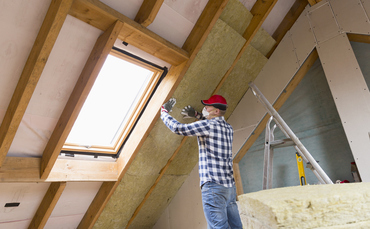'Not compliant with our climate change targets': Think tank warns many new homes will require costly retrofitting


Bright Blue unveils series of policy recommendations for government to tackle both housing and climate crisis
The government is once again facing calls to make building new green homes an urgent priority, as part of its efforts to deliver on the UK's net zero emissions goals.
Fresh analysis from think tank Bright Blue has today criticised the government for its "discretionary planning system", which it argues has made it harder to create sustainable settlements and has instead led to "urban sprawl", which it described as land-hungry, car-dependant, and politically unpopular.
The think tank stressed this is an on-going problem, noting that the UK continues to build new homes which are relatively emissions intensive and will require costly retrofitting in the future to meet long term emissions goals.
"Home ownership has fallen to its lowest level in four decades and the homes we do build are not compliant with our climate change targets," said James Cullimore, author of the report.
"With the government due to update planning policies and building regulations for net zero, now is the opportunity to unlock both greater and greener housing."
As such, the think tank's new report suggests a number of new housing policy reforms to help bring the sector into line with the UK's climate goals.
These include both a relaxing of some environmental regulations so as not to prevent homes from being built more affordably and quickly, alongside more demanding standards to ensure all new developments are consistent with net zero and biodiversity targets.
"The UK is facing both a housing and climate crisis," said Ryan Shorthouse, chief executive, Bright Blue. "We are not building enough homes. And the houses we do build are not green enough to support this country's transition to a net-zero economy. Bolder public policy is needed to support both greater and greener homes."
The report also argues that the lifestyles people lead in their new homes are just as important as the fabric of the home itself and that planning policy and building standards should require developments that are not routinely car dependent and should incentivise communities to accept new homes in existing neighbourhoods.
It has also recommended that planning reforms should ensure that communities can shape development in their area to better facilitate local democracy.
The report also features a number of specific policy proposals, including calls for the government to create and fund a Neighbourhood Development Order (NDO) Pathfinder Programme, which Bright Blue has argued could be used to bring forward homes in urban neighbourhoods.
According to the report, densification of existing settlements is the most environmentally sustainable way of increasing housing supply. To ensure it can make a greater contribution toward meeting housing targets, the report has therefore argued that the government remove the need for house builders to submit a planning application where development can be shown to have local support.
The report also recommends the government makes sure that there are enough trained heat pump installers ahead of the introduction of the Future Homes Standard in 2025, which will ban the installation of gas boilers in new homes. The report warns that without an adequate skills base, new homes could be delayed when the Future Homes Standard is introduced. It also warned that substandard installations could undermine consumer confidence in heat pump technologies.
Bright Blue has also suggested that the new National Development Management Policies (NDMP) should include a hierarchy of options to set higher environmental standards for more ambitious local authorities.
It advised that local authorities should be able to continue to set more ambitious planning requirements than the required national minimum on issues such as reducing carbon emissions and providing green infrastructure in new developments.
Other recommendations include targets for energy use intensity (EUI) and thermal energy demand limit (TED) for all new homes in the Future Homes Standards from 2025 onwards.
The think thank has also suggested that new testing requirements for all new homes and reformed Energy Performance Certificates (EPCs) should be introduced through the Future Homes Standard from 2025 onwards.
And it argued energy performance targets for new homes should incentivise energy storage and solar PV and be included in the Future Homes Standard from 2025 along with appropriate reporting requirements for whole-life carbon emissions of new homes by developers.
Green infrastructure requirements in the National Planning Policy Framework (NPPF) should also be expanded, the think tank said, along with a new set of requirements in the NPPF for Local Planning Authorities (LPAs) to create Local Development Orders (LDOs) for small and medium-sized sites to meet a proportion of their housing requirement.
"Getting to a net zero housing and planning system is one of the most important policy challenges of the decade ahead," said Owen Edwards, coalition coordinator for the Better Planning Coalition. "This report is an important addition to the discussion and offers solutions to tackling many of the most difficult issues faced by our industry today."
The government was considering a request for comment at the time of going to press.
* This article was originally published here
Comments
Post a Comment